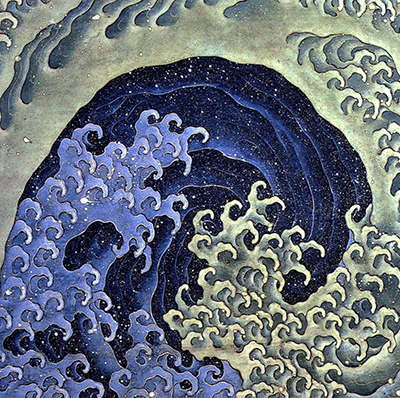Hokusai
Feminine Wave by Hokusai
Feminine Wave is an artwork by the Japanese master artist Hokusai. Hokusai is best known for his woodblock paintings and, though he lived back in the eighteenth and nineteenth centuries, he is still considered one of the finest woodblock artists that the world has ever seen.
In the period between 1829 and 1832, he painted what remains his most famous work: The Great Wave. This painting depicts a towering wave, ready to crash downwards. Both impressionistic and sublime, and drawn with both vigour and detail, this is one of the most iconic paintings in the world. The Feminine Wave is another of Hokusai’s water themed works, and it was painted on an unknown date. Nevertheless, there are clear parallels to be drawn between this work and the iconic ink painting, The Great Wave.
The Feminine Wave also depicts a towering, curling wave. However, unlike The Great Wave, this painting depicts a curlier wave that could even be described as frilly. In addition, it is bordered by a floral design. Are these elements that Hokusai considered to be specifically female? Hokusai’s wave paintings are part of a wider series of works depicting natural events: 36 Views From Mount Fuji. Hokusai was clearly fascinated by the shifting form of water – several of his other works of art depict water, including Night Fishing. His wave paintings manage to capture a dynamic wave in an almost photographic form so that we see every tiny curl. The overall impression is one of an instant captured for all time.
Considering The Feminine Wave as part of Hokusai’s overall opus leads us to wonder whether, by implication, The Great Wave should be thought of as the ‘masculine’ counterpart to the Feminine Wave? And what of his painting ‘Waves and Birds’, which depicts a curling wave almost ‘grabbing’ two soaring birds as it breaks. The title of The Feminine Wave raises many more questions than it answers. This is an artwork of mysterious beauty.
